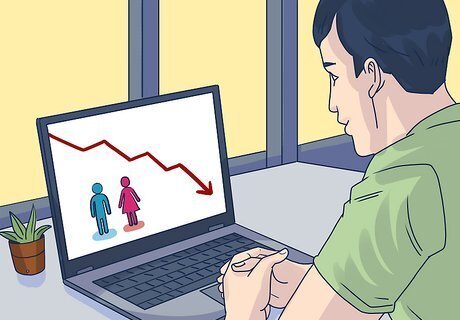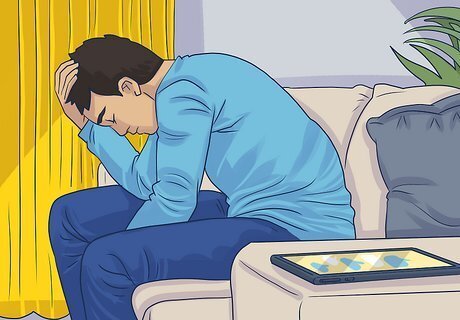
views
- Generally, “virgin” refers to someone who has never had sex, but since many people define “sex” differently, “virginity” doesn’t have a concrete definition.
- There are some cultural taboos surrounding male virginity—e.g., that a “real” man has sex early and frequently—but these taboos are totally invalid.
- Regardless whether you have sex a lot or have never had sex, it has no bearing on your worth as a person! And your sex life is really nobody’s business but yours, anyway.
What is “virginity”?

Generally, a “virgin” refers to someone who has not had sex. Different people and cultures may have varying definitions of what constitutes “sex,” though, making the term “virginity” a bit more fluid. For instance, some may consider consensual sexual activity with another partner of any gender “sex,” whether it be oral sex, mutual masturbation, or whatever. On the other hand, some with a much narrower definition of “sex” may believe sex must be heterosexual and involve penetration.
Is it OK to be a male virgin?

It’s totally OK to be a virgin, male or female. It can be extremely hard to ignore societal messaging about when you should have sex, with whom, and how often—especially because those messages are often contradictory! Listen to your gut, and try not to worry about what other people say or think. Maybe you want to lose your virginity and are having trouble finding a partner. This happens to pretty much everyone at some point, regardless of gender, and it can be super frustrating—but know that you’re not alone, and it doesn’t have any bearing on your worth. Moore advises: “Remember that sex isn’t just about having an orgasm but about exploring pleasure in all aspects in your body…. [T]ake the time on your own to touch and caress your own body to simply notice what it feels like to be present in your own body.” Maybe you genuinely have no interest at all in sex—this is completely OK! Or maybe you’re interested in sex, but are waiting for the right person or moment. Regardless of where you fall, your desires and emotions are valid, healthy—and probably way more common than you even realize.
Taboos Surrounding Virginity

Some people believe men should have sex early and often. In more patriarchal societies, sex is often seen as a sign of masculinity and dominance. Men are often treated across the board as exceptionally sexual people who “need” (heterosexual) sex. Guys who have never had sex (with girls) or who don’t care about having sex may be viewed as “weak” or “impotent.” In reality, a guy’s sexual experience or lack thereof has literally nothing to do with his character or value. On the other hand, it’s often considered taboo for a woman to have sex, or to at least be more sexually experienced than her (male) partner. “Remember that sex is about you and not about getting someone else to like you,” Nicole Moore says. “Are you [having sex] to win someone’s approval, get back at your parents, or deal with your emotions by distracting via sex? …Any unresolved emotional issues, anger, fears, or insecurities are likely to get in the way of you having the healthiest sex life.”
Are guys really having less sex nowadays?

Stats indicate that yes, guys are having less sex than they used to. In recent years, the number of heterosexual young men between the ages of 18 and 30 who are having sex has dropped. Contrary to theories that women have become more “promiscuous,” women’s sexual activity hasn’t really changed in recent decades. Most studies only cover guys aged 18 to 30 and don’t address guys who may have had sex prior to age 18—but a few studies address teen celibacy as well, and indicate a decrease in sexual activity compared to previous years. Dating apps like Tinder make it easier to find sexual partners in general—but while a popular belief says it’s “20% of guys dating 80% of women,” the stats suggest otherwise.
How common is male virginity?

In a recent study, 43% of male adolescents surveyed reported no sex. A 2018 study analyzed sexual activity (including solo masturbation) among adolescent men (aged 14-17) and found 28% of them had not engaged in sexual activity of any kind—up from 28% in 2009. Comparatively, sexual inactivity among young women increased from 49% in 2009 to 74% in 2018. Keep in mind that this data, though it came out in 2021, was recorded prior to the pandemic—meaning the percentage of sexually inactive young men is likely to have increased even more. Among high school students of all genders surveyed in 2021, 30% had never had sex. According to a 2023 study, 37% of gen-Z respondents reported being virgins.

Among young adult men, 31% reported no sex. In the same study, men aged 18-24 reported having no sex in 2018—up from 19% in 2009. Men and women together aged 25–34 also reported an increase in sexual inactivity for the same time period.
Possible Reasons Behind the Rise in Male Celibacy

People socialize less than they used to. With the rise of the internet and video games, more and more people are connecting virtually rather than in person, meaning there’s less opportunity to engage in sex. Covid-19 didn’t help, as it kept more people indoors. Young people also attend online school more than they used to. There are also fewer young people with jobs than there were in the past.

People drink less than they used to. Stats say young people just don’t drink as much as they did in past decades. Stats also say alcohol consumption is linked to 60% of casual sexual encounters among young people.

People aren’t getting married as young as they used to. The majority of people having sex are people in committed relationships. But in recent decades, people are waiting to get married, or just not getting married at all. This could be because more young people are too busy with school to get married. The economy has also gotten way worse, so there’s less financial incentive to get married and start a life together. Young people may also just feel less pressure than they used to to get married and may be more likely to wait to have sex until they’re ready, which is a good thing!

Depression and other mental health concerns are on the rise. The recent rise in depression and anxiety among young people may contribute to a lack of self-esteem and extroversion, meaning fewer young people are meeting up and having sex. It’s been shown time and again that excessive smartphone usage—increasingly common among younger generations—contributes to depression, anxiety, and loneliness. However, some scholars believe excessive phone usage also results in less opportunity for real-world human interaction, and less opportunity to build social skills.

Young people are living at home longer than previous generations did. Because the economy is terrible and more young people are going to college, they’re living with their folks longer than they used to—and Mom and Dad’s house might not exactly be conducive to a hot sex life. Because of this, some people argue, younger generations (like gen-Z and millennials) may be “putting off” adulthood for longer than older generations. The number of young people living at home was already on the rise before the Covid-19 pandemic, but lockdown only boosted that number. As of 2023, around 45% of people aged 18-34 are living with their parents. Essentially, younger people are staying “younger” for longer in many respects, including sexually.
How to Handle Virginity Anxiety

Try not to compare yourself to others. If your friends or classmates are dating or (claim to be) having lots of sex, it’s natural to feel a little anxious about your own lack of sexual activity. But remember, everyone goes at their own pace, and there’s no “timeline.” If you’re active on social media, try cutting back. It’s easy to scroll through Instagram and feel like everyone else is living a more fulfilling, sexy life than you. But what someone posts online doesn’t always show the full picture—and even if it did, it doesn’t detract from your value.

Know that not as many people are having sex as you think. The media’s always throwing it in our faces that everyone (but you) is having sex. But that’s simply not true. Even if a lot of folks do have sex early and often, there’s a large number of people who don’t—you’re not alone.

Notice what triggers your anxiety the most. Being aware of situations that set off your insecurity can help you avoid them or at least manage your response to them. For instance, if a certain friend is always bragging about their sex life or making you feel inadequate for not having sex, you might try talking to them about it if you feel comfortable, or just distance yourself from them. You may not always be able to avoid triggers, but if you know in advance that something or someone is likely to make you feel anxious, it can help you be more prepared and maybe lessen the amount of stress you might feel in the moment. Consider having a stress-relieving plan in your back pocket for when you know you’ll be in a potentially triggering situation. For example, try deep breathing exercises.

Remember to value quality over quantity. Maybe you hear peers or influencers talking about their “body count” and you worry you’ll never reach the same number. But remember that it’s the quality of your relationships, sexual or not, that matters—not the quantity of sexual partners you might have.
















Comments
0 comment